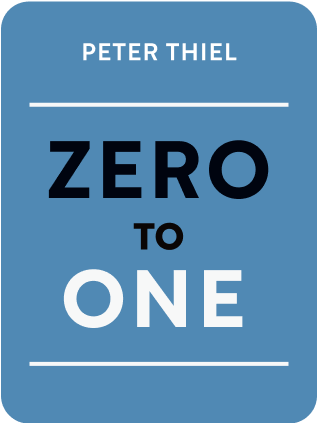

This article is an excerpt from the Shortform summary of "Zero To One" by Peter Thiel. Shortform has the world's best summaries of books you should be reading.
Like this article? Sign up for a free trial here .
Are monopolies good? How can a monopoly benefit markets and consumers?
According to Peter Thiel, the answer to “Are monopolies good?” is yes. Monopolies allow businesses to focus on innovation rather than competing with each other. Read more about the question, “Are monopolies good?” below.
Myths About Competition and Monopoly
Are monopolies good or bad for the economy? That depends on how you view the idea of competition. Anyone considering a startup should ask: “What valuable company hasn’t been built yet?”
Some companies create value without being valuable (profitable), but that isn’t enough to be successful (sustainable). A company has to accrue some of the value it creates.
Airlines in 2012 were a prime example of companies that create value without keeping much—they served millions of passengers, creating value of hundreds of billions of dollars, but made little money per passenger. While airfare averaged $178 each way, they made 37 cents per passenger trip. In contrast, Google created less value but brought in far more money—more than 100 times the airline industry’s profit margin that year. Google is worth more than three times the airline industry.
The difference is their markets: the airline industry is competitive, while Google benefits from monopoly status.
Perfect Competition
Economists have two models for markets: “perfect competition” and monopoly; perfect competition is considered to be the ideal.
Perfectly competitive markets are balanced: supply matches demand. The products are basically the same regardless of which company sells them. The price is whatever the market determines. If there’s a chance to make money, new companies enter the market, increase supply, and push prices down, thereby eliminating profits. If too many companies enter the market, some fail and prices rise again. In perfect competition, no one profits in the long run.
Monopoly
A monopoly is the opposite of perfect competition. While competing companies must sell their product at the market price, a monopoly owns the market and sets the price. But are monopolies good for consumers?
However, monopolies aren’t all the same: market domination can be achieved in different ways, some more defensible than others—for instance, bullying, acting illegally, by government sanction, or by innovating. In this book, monopoly refers to a company that’s so good at doing something that no other company can duplicate it. For example, no other company has competed with Google in search since the 2000s, when it outdistanced Microsoft and Yahoo!
Americans equate competition with capitalism, which is seen as the opposite of socialism. But competition and capitalism are really opposites—capitalism is the accumulation of profits, but in perfect competition, profits disappear.
To succeed as an entrepreneur, you need to create something new with long-term value, rather than competing with everyone else to sell the same thing.
Lying About Competition
When you ask, “Are monopolies good or bad for the economy?” you also have to consider some traditional business myths about competition. To protect their interests, companies tend to lie about their market status so that all businesses seem similar. However, most businesses are closer to one extreme or the other—perfect competition or monopoly—than it appears from what they say.
Monopolies lie because acknowledging their market control attracts attention (audits) and attacks. To keep monopoly profits rolling in, they downplay their status by claiming nonexistent competition. For example, Google distracts attention from its monopoly status in search, by emphasizing its competition in consumer tech products, where Google owns only a small share of the overall market. Which asks another question: monopolies good at staying monopolies?
Non-monopoly companies say the opposite, claiming to be in a class by themselves. Entrepreneurs like to downplay their competition; they define their market so narrowly that they stand out. For instance, a restaurant might try to focus on the way its food is different. It might claim to have a unique recipe or might focus on being the only Indian restaurant on the block, even though there is a wide variety of other ethnic restaurants in the neighborhood.
But when you focus on inconsequential differences or ignore the fact that you’re competing with all the different kinds of restaurants customers in your neighborhood could choose from, you’re not addressing your real challenges, or asking “Are monopolies good for consumers?” and are likely to fail.
Monopolies Are Better for Society
Monopolies are good for society. While it may seem counterintuitive, they can be more ethical, treat workers with greater consideration, and create more value than companies locked in competitions do.
Perfect competition is static—and a state of equilibrium or stasis eventually leads to death. In competition, one undifferentiated business is simply replaced by another.
Competitors are caught up in a daily struggle for survival. For instance, with their low margins, restaurants have to do everything possible to minimize expenses—which can include paying minimum wage to employees and putting family members to work for nothing. In survival mode, they don’t think about or plan for the future.
In a competitive market, money is the only consideration. In contrast, in a monopoly, because profits are assured, there’s room to consider other things besides money. For instance, lacking intense competition, Google can give consideration to its workers, its products, and even ethics, without risking profits.
Monopolies’ bad reputation comes from sometimes earning extreme profits at the expense of society. Certain monopolies corner the market on something that’s needed and jack up the price; customers have no choice but to pay it. This works for the owners in a world where nothing changes, like in the game of Monopoly, where you control as much real estate as you can, but you can’t create new real estate.
In contrast, creative monopolies do good and drive social progress because they operate in a different environment, a dynamic one. Instead of controlling all the options like Monopoly real estate, they create new options. They expand consumers’ choices by creating new categories of things. By adding value, they make society better.
This social value is why the government, in effect, creates monopolies by granting patents; patents are an incentive and a reward for creating more choices. It’s reasonable to question whether the government should award a company monopoly rights for thinking of new software. But in a case like Apple’s iPhone, enabling the company’s monopoly profits is a legitimate reward for creating something that has benefited society enormously.
Creative monopolies drive progress rather than holding it back because the reward of years of monopoly profits is a great incentive to innovate. Further, they can continue innovating because their profits allow them to develop additional new products. When they stop, a better monopoly takes over. So, when you’re considering the idea “Are monopolies good or bad for the economy?” you should take the full picture into account, and consider a different viewpoint on monopolies.
New products can’t be created in a market state of equilibrium. A business succeeds only to the extent that it does something unique. For from being undesirable, monopoly is a requirement for success.
Are monopolies good for consumers? Peter Thiel argues yes. He says that monopolies are good for both consumers and businesses.

———End of Preview———
Like what you just read? Read the rest of the world's best summary of Peter Thiel's "Zero To One" at Shortform .
Here's what you'll find in our full Zero To One summary :
- Why some companies genuinely move the world forward when most don't
- How to build a company that becomes a monopoly (and why monopolies aren't bad)
- Silicon Valley secrets to selling products and building rockstar teams






